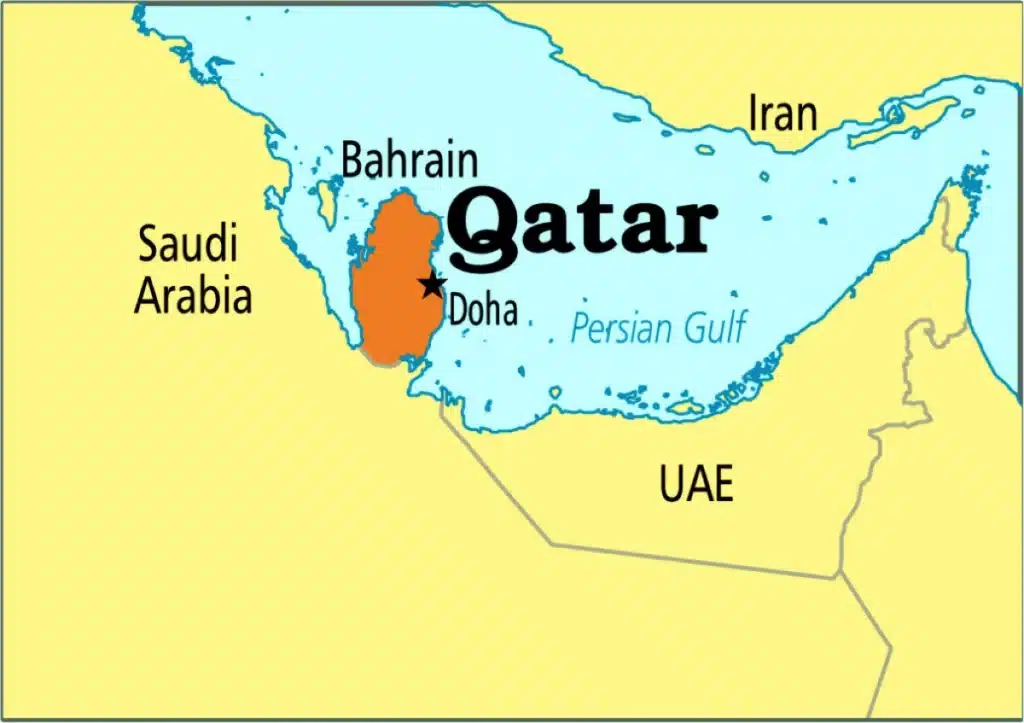
India and Qatar have had close ties for a long time, and they talk regularly and about important things, even at the top levels of their governments. This has made it easy for them to work together in many different areas.
The large, diverse, successful, and well-respected Indian community is a big part of Qatar’s growth and helps to keep the strong bonds of friendship and cooperation between the two countries going strong.
Table of Contents
- 1 Political Areas of Cooperation
- 2 Trade and Investment
- 3 Culture and the Indian diaspora
- 4 Yoga:
- 5 Defence
- 6 Health:
- 7 Education:
- 8 How important Qatar is to India
- 9 Qatar Crisis
- 10 Has such steps been taken in past?
- 11 Stand of other Countries in the Region
- 12 Impact
- 13 On India:
- 14 On the World:
- 15 India’s Stand on the Issue
- 16 Critical Perspectives
- 17 Conclusion:
Political Areas of Cooperation
• On June 4 and 5, 2016, the Emir of Qatar, HH Sheikh Tamim bin Hamad Al Thani, invited the Prime Minister of India, Shri Narendra Modi, to pay an important official visit to Doha. This was a big deal.
• The PM’s visit gave both countries a great chance to talk at the top level and gave bilateral relations a new boost.
• This was the most important visit from India to Qatar since Dr. Manmohan Singh went there in November 2008.
• In the past few years, there has been a regular exchange of high-level trips between the two countries. In March 2015, the Emir of Qatar, HH Sheikh Tamim Bin Hamad Al Thani, went to India on a State Visit.
• India and Qatar have agreed to strengthen and expand their bilateral relations in areas like high-level political meetings, defence and security cooperation, trade and economic relations, and people-to-people links.
• Things that happened during the visit of the Indian Vice President in June 2022:
India-Qatar Start Up bridge: The “India-Qatar Start Up bridge” was started by the Vice President. Its goal is to connect the start-up communities of the two countries.
With more than 70,000 registered startups, India has become the third biggest ecosystem for startups in the world. India is also home to 100 unicorns that are worth more than USD 300 billion as a whole.
Environment and Climate Change: The Vice President asked Qatar, which India relies on for its energy security, to join the International Solar Alliance (ISA) and work with India to make the world a better place to live.
Joint Business Council Between Business Chambers: The Business Chambers of India and Qatar have set up a Joint Business Council, and its work will be done by a Joint Task Force on Investments.
o Invest India and the Qatar Investment Promotion Agency were praised for working together to help businesses on both sides take advantage of new and emerging possibilities.
Collaborations in Multilateral Forums: It was emphasised that India and Qatar should work together more in multilateral forums like the Inter Parliamentary Union (IPU), the Asian Parliamentary Assembly, and others.
Trade and Investment
• More than 65% of all of India’s LNG imports come from Qatar, and 15% of all of Qatar’s LNG exports go to India.
• In 2015, a deal was made with RasGas for an extra supply of 1 million tonnes of LNG per year for the rest of the 25-year contract, which ends in 2028.
• The trade balance is still very much in Qatar’s direction.
• In 2014–15, India’s exports were more than $1 billion ($1056 million), but trade between the two countries dropped to $15.7 billion because Qatar’s exports to India went down.
• In 2020-21, India and Qatar did US$ 9.21 billion worth of business with each other. In 2019-20, two-way trade was worth USD 10.95 billion.
During 2020-21, India sold $1.28 billion worth of goods to Qatar. It bought $7.93 billion worth of goods from Qatar.
Qatar’s main exports to India are LNG, LPG, chemicals and petrochemicals, plastics, and aluminium articles. India’s main exports to Qatar are cereals, copper articles, iron and steel articles, vegetables, fruits, spices, processed food products, electrical and other machinery, plastic products, construction material, textiles & garments, chemicals, precious stones, and rubber. Qatar Investment Authority (QIA), which manages Qatar’s sovereign wealth fund, is looking for good investment opportunities in India’s infrastructural sectors. • There is a lot of potential for QIA to significantly increase its investments in India, given India’s huge investment needs ($1 trillion in the next five years just for infrastructural sectors) and investment-friendly policies, as well as QIA’s desire to diversify its portfolio around the world.
Culture and the Indian diaspora
• India and Qatar have strong cultural links that both countries work hard to keep alive. Qataris like India’s many different cultures. During the former Emir’s visit in April 2012, both countries made an agreement to work together on cultural projects.
• The year 2019 was marked as the India-Qatar Year of Culture, as planned in the Joint Statement released during PM Modi’s trip to Qatar.
Yoga:
India is very grateful to Qatar for cosponsoring its Resolution at the UNGA, which was passed unanimously with a record 177 cosponsors and made June 21st the International Day of Yoga (IDY) and called for a number of events to celebrate the first IDY in Qatar.
Defence
• The India-Qatar Defence Cooperation Agreement was signed in November 2008 when the former PM went to Qatar, and it was renewed for another five years in 2013.
• In Goa, India, the Ninth International Land, Naval, Internal Homeland Security and Defence System Exposition (DEFEXPO INDIA-2016) was held. A high-level team from the Qatar Emiri Land Forces was there.
• The Qatari side has shown interest in the ‘Make in India’ chances for joint production of military equipment in India.
• India always goes to the Doha International Maritime Defence Exhibition and Conference (DIMDEX) in Qatar, which happens every two years.
• Ships from the Indian Navy and Coast Guard often visit Qatar as a way for the two countries to work together and talk to each other.
The naval practise between the Indian Navy and the Qatar Navy is called “Za’ir-Al-Bahr,” which means “Roar of the Sea.” So far, India and Qatar have only worked together on defence through training, attending each other’s conferences and events, and having ships from the Indian Navy and Coast Guard visit Qatar.
Health:
The special Amiri Air force plane was used by the Qatar Fund for Development (QFFD) to send medical supplies to India to help fight the second wave of Covid-19.
• The Indian population in Qatar also sent a lot of things to India that had to do with oxygen.
Education:
• There are 14 Indian schools in Qatar. Most of the students in these schools are the children of Indian people who work in Qatar.
Over 700,000 Indians live in Qatar. They make up the largest expatriate community there. They work in many different fields, such as medicine, engineering, education, finance, banking, business, media, and a lot of blue-collar jobs.
• Remittances: It is believed that the Indian expatriate community in Qatar sends about 750 million dollars back to India every year.
How important Qatar is to India
• There are more Indians living in Qatar than any other nationality. The money that Indians send home from Qatar, as well as the respect and safety of Indians in the country, make Qatar very important to India.
• India gets most of its LNG from Qatar. It is important for India’s energy security because of this.
• Since Qatar is a part of the GCC, it is important for India to protect its interests there, especially when it comes to the Kashmir issue.
• India needs Qatar’s help to get a permanent place on the UN Security Council.
• Companies from India like Tata Consultancy Services Ltd, Wipro, Mahindra Tech, and Larsen & Toubro Limited do business in Qatar.
• It is important for India’s energy and maritime security that the Gulf area stays stable.
________________________________________
Qatar Crisis
• In June 2017, countries in the Gulf, such as Saudi Arabia, the United Arab Emirates, and Bahrain, cut ties with Qatar. Qatar and other GCC countries, like Saudi Arabia, the United Arab Emirates, and Bahrain, have had disagreements in the past. But this is the first time that a group of unfriendly actions have been taken against Qatar all at once.
• In June 2017, Qatar’s Arab neighbours Saudi Arabia, the United Arab Emirates, Bahrain, and Egypt cut off Qatar’s shipping routes and air space because they thought Qatar supported terrorism and had links with Iran (Iran is run by Shias, while Saudi Arabia is run by Sunnis). In Islam, Shia and Sunni are two different groups.
It broke their political and business links with Qatar.
• Qatar, on the other hand, has said that it doesn’t back Islamic extremism and that its isolation is a clear attack on its sovereignty.
• Saudi Arabia and its partners cut off Qatar by land, air, and sea. Egypt and Yemen soon joined the fight against Qatar as well. The UAE, Saudi Arabia, and Bahrain asked Qatari officials and citizens to leave. A blockade was also put in place against Qatar on the business front.
• All four neighbours put out a list of 13 requests that Doha, the capital of Qatar, must meet in order for old relationships to be repaired.
Some of the requests were that Qatar shut down news stations like Al-Jazeera, cut ties with radical Islamist groups like the Muslim Brotherhood, cut ties with Shia-majority Iran, and get rid of the Turkish troops that were stationed there.
Since 2017, the blockade of Qatar has included: closing Qatar’s only land border with Saudi Arabia; stopping Qatari ships from entering any port in the Saudi coalition; and stopping Qatari planes from flying in their skies.
As part of the steps, Qatari people will be kicked out of these countries.
Has such steps been taken in past?
Yes, in 2014. Qatar backs the Sunni Islamist political group Muslim Brotherhood, which Saudi Arabia and the UAE have both banned.
• In 2014, Saudi Arabia, the UAE, and Bahrain called back their representatives from Qatar because of this.
After Qatar forced some Brotherhood members to leave the country, things didn’t get back to normal for eight months.
Stand of other Countries in the Region
• Kuwait and Oman, which are also members of the Gulf Cooperation Council, have not cut ties with Qatar. Kuwait has offered to help solve the problem, and both Turkey and Iran have let more Qatari planes fly through their area.
Impact
On Gulf Region and Qatar
• Flights to and from Doha have been stopped, which affects a lot of people in the area.
• A story says that about 40% of Qatar’s food comes through its land border with Saudi Arabia, which is now closed. So, Qatar may not have enough food.
• Instability in the oil-rich region will hurt business and trade, and it will also change the area’s political situation.
Moody says that in the first two months of sanctions, Qatar spent $38.5 billion to keep its economy going, which is equal to 23% of its GDP.
On India:
About 6 to 8 million Indians live in the area. There isn’t going to be a problem with travel between India and Qatar. People from India who want to use Doha as a hub to go to other places in the Gulf will be affected. It could affect how much money people send home from the area.
• The Indian people who live in Qatar could be affected by an economic boycott just like everyone else.
• India’s reliance on oil from the Gulf could be affected by the conflict between Qatar and other Gulf countries.
• It could affect India’s plans to link to West Asia, Central Asia, and Africa (like the INSTC and the undersea gas pipeline between India and Iran).
On the World:
• The way Qatar is treated could be used as a model for future negotiations. This would weaken the international order, the rule of law, and the UN system for resolving conflicts.
• There are also signs that this could be the start of a bigger fight with Iran. • Qatar is the largest exporter of LNG in the world and has a booming financial industry. It is also important for the military because it is where the U.S. CENTCOM (central command) is based. Qatar is also home to the air command for the U.S.-led war against the Islamic State. This means that there are too many things at stake for the U.S. to choose a side in this international dispute.
India’s Stand on the Issue
• The India Foreign Ministry office said that this is a “internal matter” of the GCC countries. India also gets along well with Saudi Arabia, which is the largest producer of crude oil in the world. Abu Dhabi in the UAE is also a big oil exporter. Qatar is the biggest provider of liquefied natural gas (LNG) and a big seller of condensate, which is a low-density liquid fuel and refining product made from natural gas.So, India needs to take a balanced position for now, unless Indians who live in Qatar are seriously impacted. To keep these links from being affected by the tensions in West Asia, it will take even more skillful diplomacy than just staying out of the Arab splits.
Critical Perspectives
• The US support has “given the Saudis and their allies a blank cheque” by agreeing to cover the risks of going to war with Qatar.
• Since the Arab Spring, both Saudi Arabia and the UAE see the Muslim Brotherhood as a political threat to their patronage-based, royal family-led order at home, as well as a strategic threat from Iran, which is seen to be expanding its power in the region through its sectarian allies.
• The idea that Arabs are united is shown to be a myth over and over again. This myth and the dark side of undemocratic rule in these Arab countries are shown again by the present crisis.
• India is in a tough spot because it gets along well with all of these countries. The official Indian response to the situation is a standard statement.
• India can’t do much about this fight, which is mostly between family members and is fueled by geopolitical rivalries in the area. India will worry about the safety of its people and the flow of electricity, especially gas from Qatar.
Conclusion:
All of these countries are close neighbours, so it’s important to have good relationships with them. This is true not only for domestic needs and Diasporas, but also for getting the right to stand tall on a global level.
• India shouldn’t be afraid to do good things for world peace and to work with the region and even kingdoms like Qatar, Bahrain, etc. in a positive way.





![UPSC CSE Topper Mains Answer [Gaurav Agarwal] word-image-10753-1](https://iasbio.com/wp-content/uploads/2023/06/word-image-10753-1-150x150.png)










